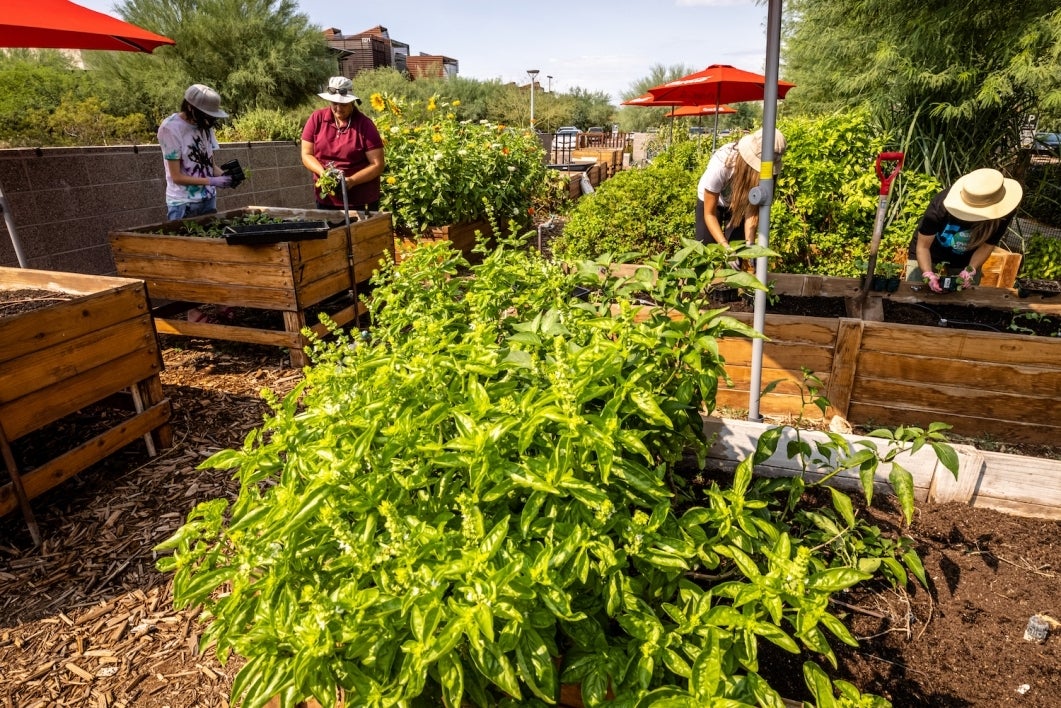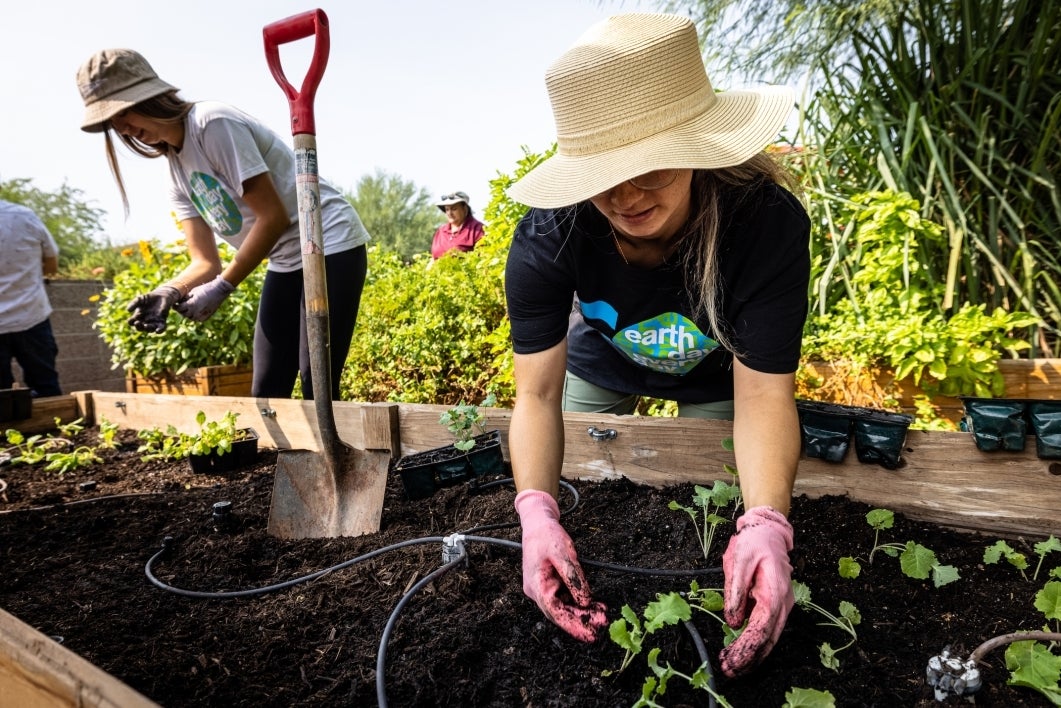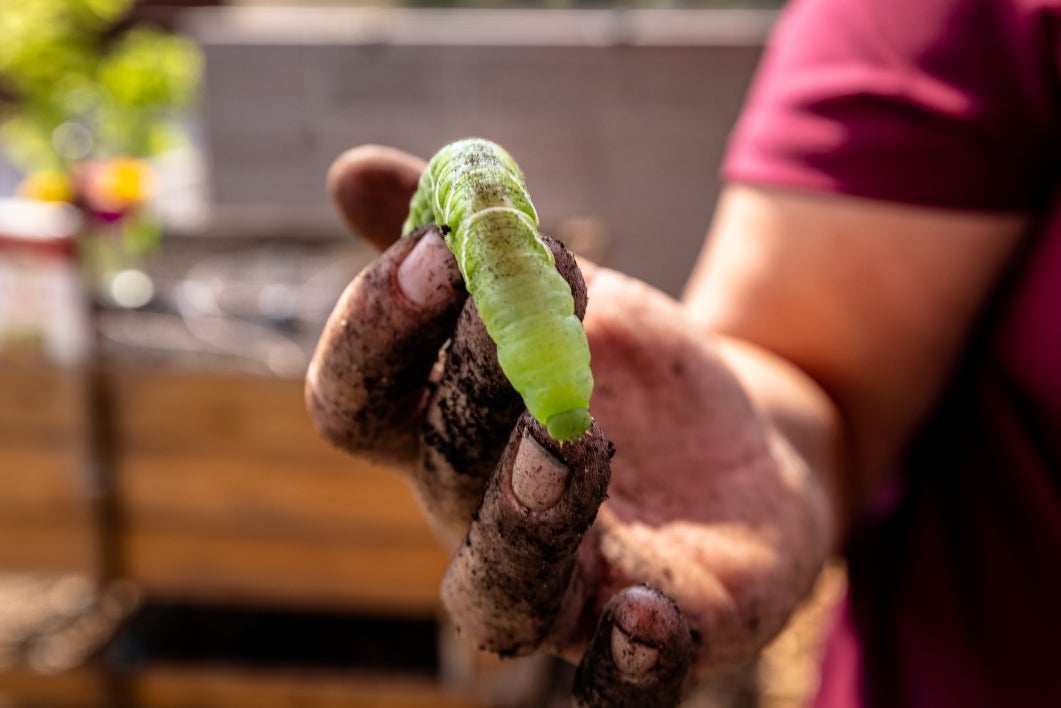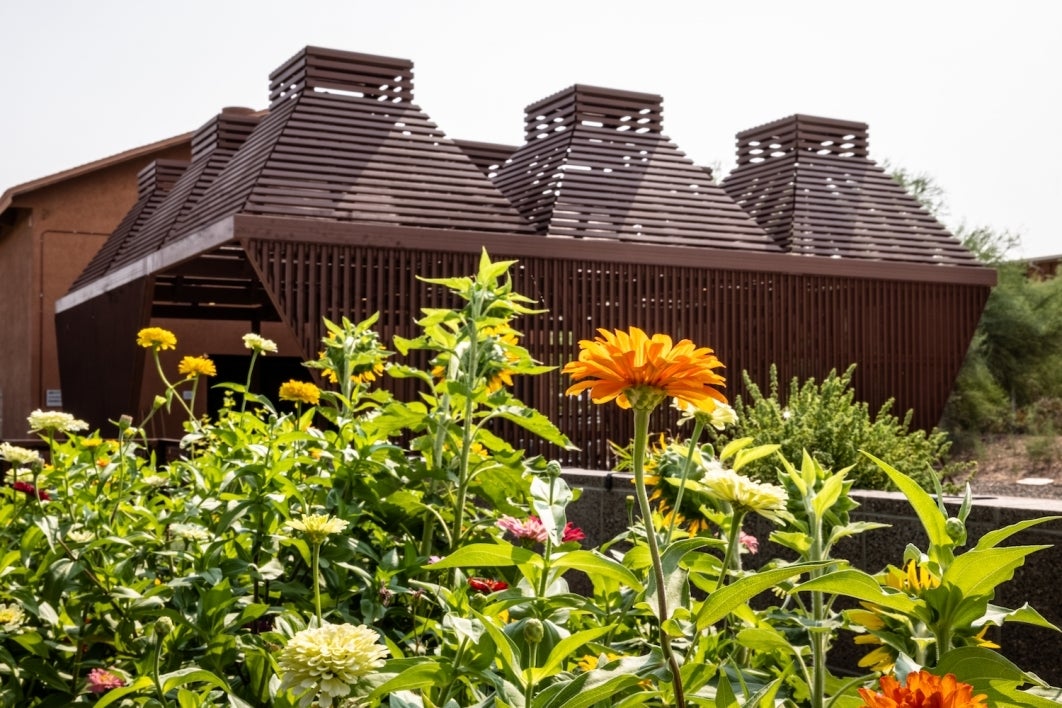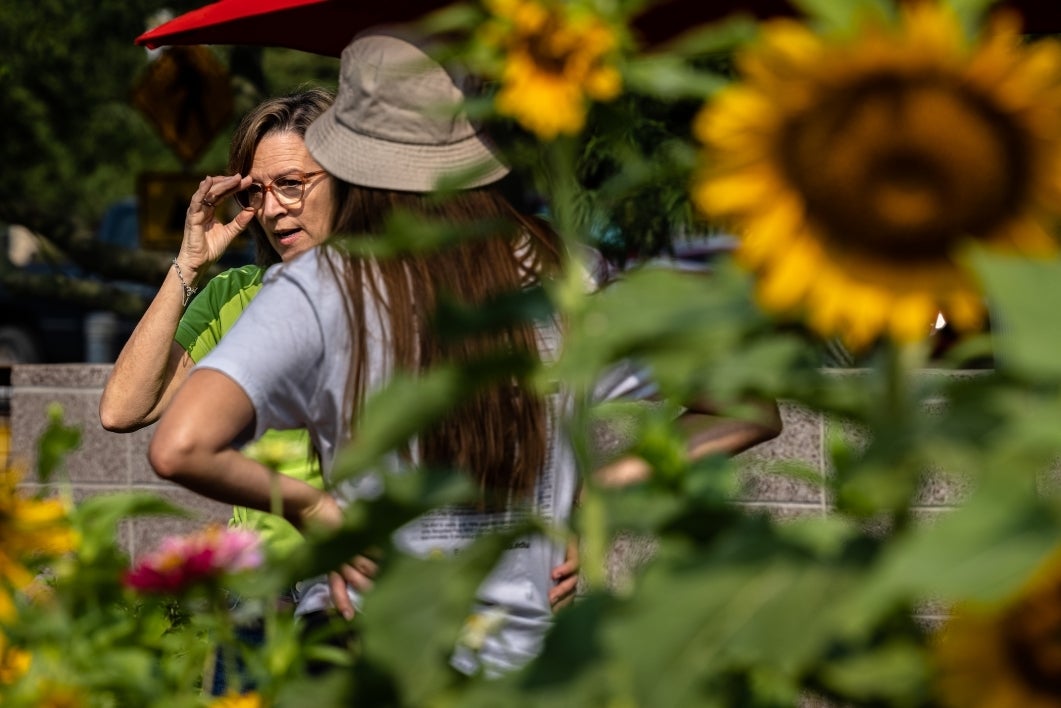Arizona State University first-year student Briana Wells has always been mindful of the universe around her and the carbon footprint she leaves behind.
She recycles cans, bottles, paper and old books, and she repurposes items for other uses in her daily life. But this year she wanted to step up her commitment.
That’s why she spent a few hours on a recent Monday toiling in the sun — planting bok choy, cilantro and jalapeños — along with a handful of other ASU students and staff in The Garden Commons on Arizona State University's Polytechnic campus.
“I’ve always liked plants, and I want to do my part for the environment,” said Wells, a robotics major in the Ira A. Fulton Schools of Engineering. “Even though it’s not much, I still want to contribute. ASU has a large audience, and getting out the message of sustainability is something I really like about the university.”
Held every October, Campus Sustainability Month was started by the Association for the Advancement of Sustainability in Higher Education (AASHE) and is an international celebration that encourages seeking innovative ways to make a positive impact on the world.
“Campus Sustainability Month is a chance for ASU to highlight our leadership and commitment to sustainability within our campus and the community,” said Susan Norton, program manager for University Sustainability Practices. “It is also a way to educate and engage the campus community about our numerous sustainability programs that speak to actionable steps one can take to help ASU advance our sustainability goals.”
All throughout the month of October, ASU has organized activities, events and experiences on different campuses to engage and inspire incoming students and other campus stakeholders to become sustainability change agents. They include sustainability tours and displays, recycling audits, produce giveaways, service projects and much more.
In addition to the Julie Ann Wrigley Global Futures Laboratory — launched with the goal of keeping our planet habitable and home to the first ever school dedicated to sustainability — ASU is a global leader in this field.
And it’s not just talk — the proof is in the pudding.
Last month ASU ranked No. 1 on Sierra magazine’s annual “coolest schools” ranking of the most environmentally friendly colleges and universities in North America.
This marks the first time the university attained this honor out of a record 328 institutions, rising from No. 4 previously, thanks to its comprehensive approach to sustainability that spans academia, campus operations, student life and endowment investments. This is the seventh year ASU has scored in the top 10 of the Sierra Club’s national publication.
ASU is also one of the few institutions in the world that carries a platinum rating by AASHE, which provides a sustainability tracking assessment for colleges and universities.
In 2020, the university surpassed its lofty ambition to achieve climate neutrality by 2025 — six years ahead of its original goal.
There's also how ASU constructs sustainable building projects, shades its campuses and "LEEDs" the charge when it comes to demonstrating sustainability.
The university now has 65 LEED-certified building projects and 90 solar installations on all four campuses in the metro Phoenix area. The installations tally approximately 90,000 solar panels, shaded parking spots and stadium seats.
Beyond rankings, buildings and solar panels, ASU has fostered a sustainability community of faculty, scholars, staff and students who are free to explore and create sustainability programs and get others to thinking about their role in helping the environment.
People like Tyler Eglen, a project manager for Rob and Melani Sustainability Solutions Service in the Julie Ann Wrigley Global Futures Laboratory. Last year when he was a graduate student, Eglen started a student organization chapter of Precious Plastic @ASU. The group, composed of about 40 students, utilizes social engagement, a suite of semi-industrial plastic-processing machines and education to empower people to clean up and recycle plastic waste.
“I was awarded $5,000 through a Sustainbility Initiatives Revolving Fund grant from Zero Waste, and they encouraged me to create this student-run organization to support sustainability efforts, so that’s how it got started,” Eglen said. “We used the money to create a plastic-shredding machine in ASU’s Design School.”
Eglen said the club collects plastic items from the campus, shreds them into a “flake” and places them into an extruder to create new products. One of the products is plastic lumber, often used for park benches, porches and at playgrounds.
“Plastic lumber is a great solution for wood since wood prices are going through the roof,” Eglen said. “It reduces waste, and it’s much more durable than wood.”
ASU senior Madelynne Greathouse has dedicated her academic career to sustainability. She believes it’s going to play a big role in her future.
“The idea that ASU was committed to making our environment a better place was attractive to me when I first came here from Colorado,” said Greathouse, who is a sustainability major in the College of Global Futures and a student worker for University Sustainability Practices. “The discipline of sustainability is so broad and up and coming. I feel that’s the cutting edge of innovation.”
A month of sustainability events
Sustainability Displays on Campus
Oct. 4–25
Learn about various campus displays that speak to ASU’s commitment and dedication to ASU’s sustainable practices. Locations include all dining halls on each campus and various spots on the ASU Tempe and Polytechnic campuses.
Sustainability Walking Tours
11 a.m. Oct. 6; 9 a.m. Oct. 14; 11 a.m. Oct. 18
Student Pavilion (by the front entrance), Tempe campus
RSVP required
Take a guided walking around the Tempe campus and learn about sustainability points of pride. The first 10 people to register and attend each walking tour will receive a sustainable swag bag.
Green Event Planner Training
1–2:15 p.m. Oct. 6
Memorial Union 224 Gila Room, Tempe campus, or join via Zoom
RSVP required
This interactive presentation will give participants the tools needed to plan, execute and manage an environmentally friendly event.
U.S. Green Building Council and LEED Zoom Information Session
9–10 a.m. Oct. 7, via Zoom; noon–1 p.m. Oct. 15, via Zoom; 9–10 a.m. Oct. 21, via Zoom; noon–1 p.m. Oct. 28, via Zoom
Join staff from the U.S. Green Building Council and University Sustainability Practices on sustainable building and LEED accreditation.
Plant Walk and Talk
10–10:45 a.m. Oct. 12
Student Union, Polytechnic campus
RSVP required
Join University Sustainability Practices for this walk, which will identify the common edible desert plants growing on the ASU Polytechnic campus. Participants should be prepared for a 45-minute walk.
Global Conference on Sustainability in Higher Education
Oct. 12–14, online
Register
ASU’s Global Futures Laboratory is the host institution for this year’s virtual conference, which will offer three full days of live content and networking.
Fair Trade Chocolate Table at Tooker House
11 a.m.–noon Oct. 13
Tooker House patio, Tempe campus
Stop by and try chocolate samples while learning about the importance of fair trade practices.
Lunch and Learn: Luffa in the Garden
Noon–1 p.m. Oct. 20
Garden Commons, Polytechnic campus
Register
A garden can grow more than veggies and herbs. Luffas (or loufahs) are biodegradable sponges that thrive in our desert climate. During this lunch and learn, join University Sustainability Practices and discover how to grow, harvest and process luffa sponges to use in the kitchen and bath. Participants will receive luffa seeds and a sponge. Bring your lunch and enjoy under the newly constructed shade pavilion.
Find more events on the Campus Sustainability Month website and at ASU Events.
Top photo: First-year robotics student Briana Wells plants bok choy in a raised garden bed in the Garden Commons on the Polytechnic campus Sept. 27. Photo by Charlie Leight/ASU News
More Environment and sustainability

Rethinking Water West conference explores sustainable solutions
How do you secure a future with clean, affordable water for fast-growing populations in places that are contending with unending drought, rising heat and a lot of outdated water supply infrastructure…
Meet the young students who designed an ocean-cleaning robot
A classroom in the middle of the Sonoran Desert might be the last place you’d expect to find ocean research — but that’s exactly what’s happening at Harvest Preparatory Academy in Yuma, Arizona.…

From ASU to the Amazon: Student bridges communities with solar canoe project
While Elizabeth Swanson Andi’s peers were lining up to collect their diplomas at the fall 2018 graduation ceremony at Arizona State University, she was on a plane headed to the Amazon rainforest in…



